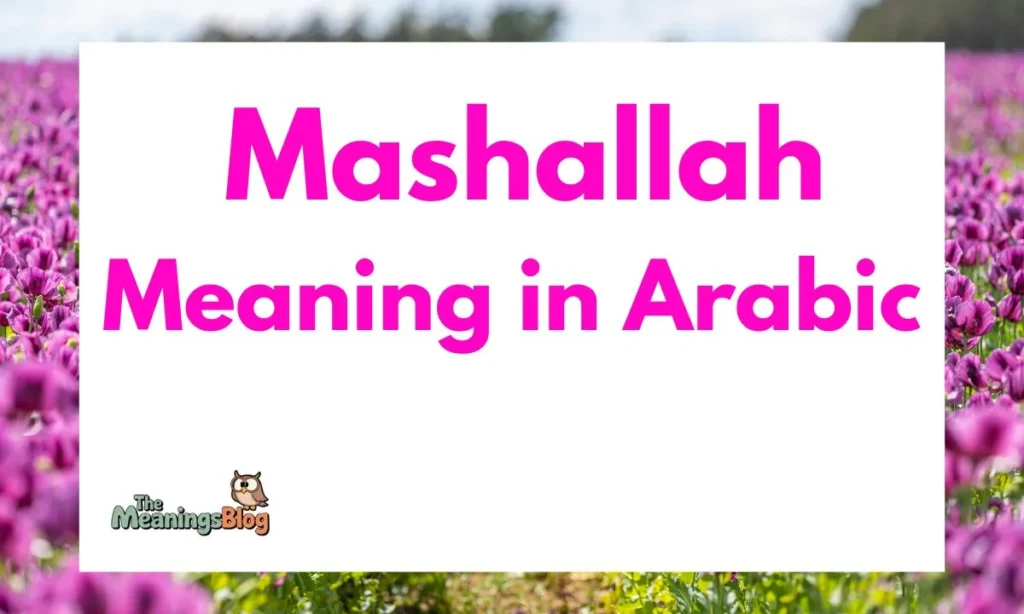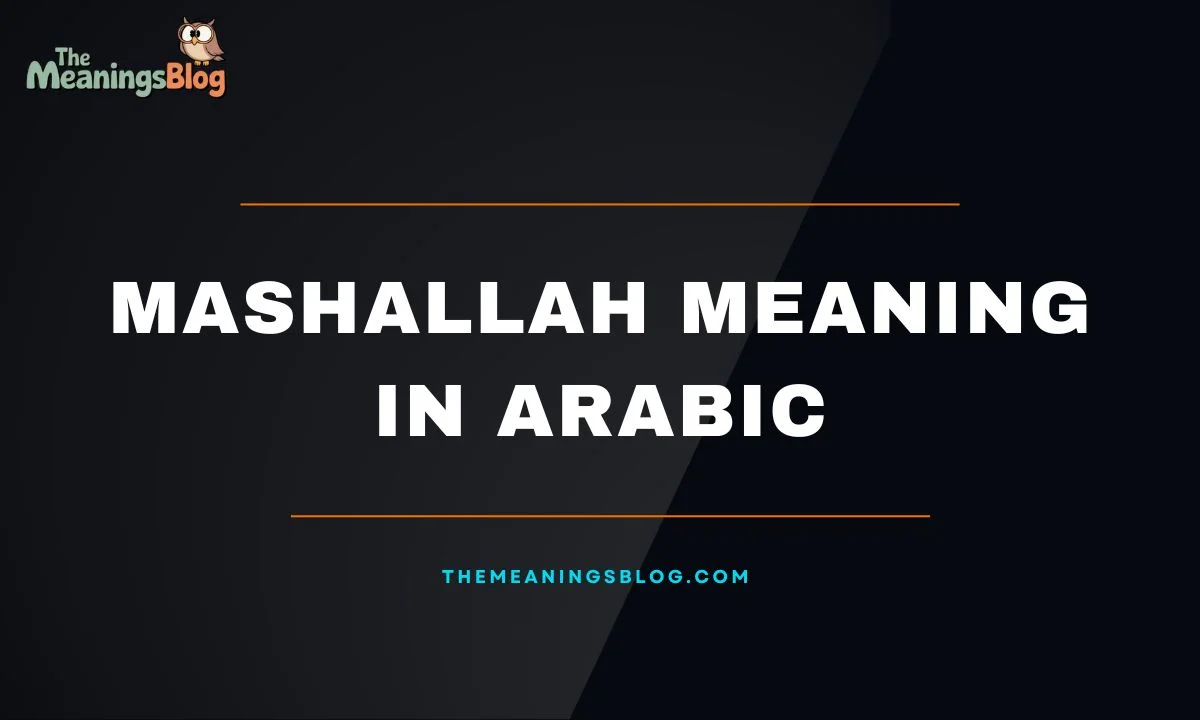The Arabic phrase “Mashallah” is widely recognized worldwide. Muslims and Arabic speakers use it in daily life. It expresses gratitude while acknowledging God’s divine will. This beautiful expression connects faith with everyday conversations naturally.
Understanding the Mashallah meaning in Arabic enriches your vocabulary. It helps you appreciate Islamic cultural traditions more deeply. Learning this phrase opens doors to meaningful cross-cultural communication. You’ll connect better with millions of Arabic-speaking people globally.
Mashallah Meaning in Arabic

The Mashallah meaning in Arabic translates to God’s will. It means “What Allah has willed” in English translation. People say it when admiring something beautiful or blessed. This phrase acknowledges that all good comes from Allah.
When someone uses this Arabic phrase Mashallah, they praise. They express wonder at Allah’s creation and divine blessings. It shows humility and prevents feelings of envy naturally. The Ma shaa Allah translation carries deep spiritual significance always.
Arabic speakers pronounce it as “Ma-shaa-Allah” with clear emphasis. The stress falls naturally on the middle syllable “shaa”. This Islamic expression Mashallah flows smoothly when spoken correctly. Native speakers connect all three words without pausing between.
Read More: Abdullah Meaning in Arabic
Linguistic Root and Grammatical Usage
The root of Mashallah Arabic comes from ancient letters. These Arabic root letters ش-ء-ل relate to divine will. The verb form means “to will” or “to desire”. This foundation shapes the entire phrase’s powerful spiritual meaning.
| Arabic Component | Transliteration | English Meaning | Grammatical Role |
| ما | Ma | What | Interrogative pronoun |
| شاء | Shaa | He willed | Past tense verb (3rd person masculine) |
| الله | Allah | God/Allah | Proper noun (Divine name) |
| ما شاء الله | Mashallah | What Allah has willed | Fixed phrase/Complete expression |
This fixed phrase Arabic Mashallah never changes its form. The Mashallah grammar usage remains constant regardless of context. Whether praising men, women, or children, you say “Mashallah”. The phrase doesn’t need modification for gender or number.
Examples of “Mashallah” in Arabic Sentences
Arabic: ما شاء الله، طفلك جميل جداً!
English: Mashallah, your baby is very beautiful!
Arabic: ما شاء الله، نجحت في الامتحان بتفوق.
English: Mashallah, you passed the exam with excellence.
Arabic: البنت ذكية، ما شاء الله عليها.
English: The girl is intelligent, Mashallah upon her.
Arabic: ما شاء الله، سيارتك الجديدة رائعة!
English: Mashallah, your new car is wonderful!
Arabic: أخوك حفظ القرآن كاملاً، ما شاء الله.
English: Your brother memorized the entire Quran, Mashallah.
Arabic: ما شاء الله، حديقتكم مليئة بالأزهار الجميلة.
English: Mashallah, your garden is full of beautiful flowers.
Arabic: الطعام لذيذ جداً، ما شاء الله على يديك.
English: The food is delicious, Mashallah on your hands.
Arabic: ما شاء الله، أولادك مؤدبون ومحترمون.
English: Mashallah, your children are polite and respectful.
Arabic: ما شاء الله، بيتكم نظيف ومرتب دائماً.
English: Mashallah, your house is always clean and organized.
Arabic: نجح في عمله الجديد، ما شاء الله تبارك الله.
English: He succeeded in his new job, Mashallah Tabarakallah.
Difference Between Mashallah And Inshallah in Arabic
Both phrases reference Allah but serve different communicative purposes. The Mashallah vs Inshallah difference lies in their timing. “Mashallah” acknowledges blessings that already exist or happened recently. “Inshallah” expresses hope for future events to occur successfully.
| Aspect | Mashallah (ما شاء الله) | Inshallah (إن شاء الله) |
| Literal Meaning | What Allah has willed | If Allah wills |
| Time Reference | Past or present events | Future events or plans |
| Usage Purpose | Express admiration, praise, gratitude | Express hope, intention, plans |
| Example Context | “Mashallah, you look healthy today” | “Inshallah, I will visit you tomorrow” |
| Emotional Tone | Appreciation and protection from envy | Hope and trust in Allah’s plan |
| When to Say | After seeing something good/beautiful | Before doing something in the future |
Cultural or Quranic Significance of “Mashallah”
The Mashallah cultural significance stems from Quranic teachings directly. This phrase appears in Surah Al-Kahf with clear guidance. Muslims use it to follow prophetic tradition and wisdom. The Mashallah in Quran verse teaches us proper gratitude.
Arabic: وَلَوْلَا إِذْ دَخَلْتَ جَنَّتَكَ قُلْتَ مَا شَاءَ اللَّهُ لَا قُوَّةَ إِلَّا بِاللَّهِ
English: “And why did you not say when you entered your garden, ‘What Allah willed [has occurred]; there is no power except in Allah’?” (Quran 18:39)
This verse shows how to use Mashallah properly. It teaches humility when witnessing Allah’s blessings and gifts. The phrase protects against arrogance and harmful jealousy naturally.
Read More: Samara Meaning in Arabic
Common Misunderstandings or Mistakes
People often confuse this phrase with other expressions mistakenly. New learners make pronunciation errors when first attempting it. These Mashallah common mistakes can change the meaning completely unintentionally. Understanding proper usage prevents awkward cultural misunderstandings in conversations.
| Mistake | Why It’s Wrong | Correct Usage |
| Confusing with “Inshallah” | Different meanings and timing | Use “Mashallah” for present/past, “Inshallah” for future |
| Pronouncing as “Masha’Allah” (with pause) | Creates unnatural break in phrase | Say “Mashallah” as one connected word |
| Using for negative events | Inappropriate for bad situations | Use “Inna Lillahi wa inna ilayhi raji’un” instead |
| Saying it sarcastically | Disrespects the sacred phrase | Always use sincerely and respectfully |
| Forgetting to say it | Misses protection from evil eye | Say when admiring to avoid envy |
| Overusing without sincerity | Becomes meaningless repetition | Use genuinely when truly amazed or grateful |
Why You Should Learn “Mashallah”
Learning this phrase benefits your Arabic language skills significantly. The Mashallah meaning in Arabic reflects deep Islamic values. It helps you communicate respect in Muslim-majority countries effectively. Understanding when to say Mashallah shows cultural intelligence and awareness.
Benefits of learning this expression include:
- Shows respect when giving compliments to Arabic speakers properly
- Protects relationships by acknowledging Allah in all good things
- Demonstrates cultural awareness and sensitivity in Muslim communities worldwide
- Helps avoid unintentional envy or negative energy toward others
- Enriches your understanding of Islamic faith and Arabic traditions
- Makes conversations more natural with native Arabic speakers daily
- Teaches humility by attributing success to Allah’s will always
- Opens doors to deeper friendships with Muslim colleagues and friends
Frequently Asked Questions
What is the meaning of Mashallah in Arabic?
Mashallah in Arabic means “What Allah has willed” or “As God has willed,” showing gratitude and admiration.
How do you say Mashallah in Arabic?
It is written as ما شاء الله and pronounced Ma-sha-Allah.
When should I say Mashallah?
You say Mashallah when you admire something good, to thank Allah and avoid the evil eye.
Is Mashallah from the Quran?
Yes, a similar phrase appears in Surah Al-Kahf (18:39), teaching believers to recognize Allah’s will.
What is the difference between Mashallah and Inshallah?
Mashallah is used for what has happened, while Inshallah means “If God wills” for future events.
Last Words
Mashallah is a beautiful Arabic word that shows gratitude and faith. It reminds people that every blessing comes from Allah. Saying Mashallah spreads positivity and protects from jealousy.
This word connects faith, respect, and culture in a simple way. It is often used to admire something good while remembering God’s will. Learning and using Mashallah brings peace and thankfulness to daily life.

Noah shares deep insights into meanings, metaphors, and sermons, inspiring readers with wisdom and reflection. His passion is uncovering hidden truths that bring clarity, inspiration, and spiritual growth to everyday life.








